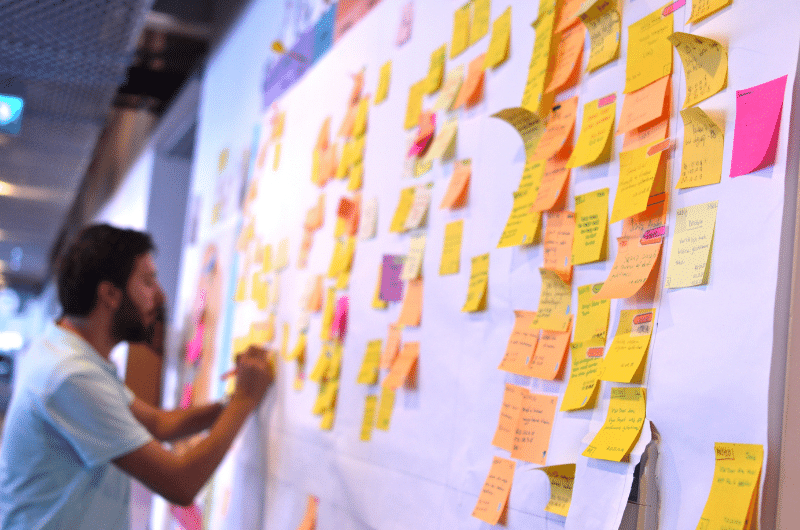
Are Agile methodologies the future of project management?
Project management is considered essential to any business landscape today because of its efficiency in delivering business deadlines.
Like any other managerial technique, project management is also dynamic and keeps undergoing changes and modifications over the years.
Know more about our programme

Today, there are countless project management strategies to choose from depending upon the project requirements and your capabilities as a project manager. The Agile project management methodology remains one of the most popular project management approaches owing to its flexibility and effectiveness.
According to Gartner reports, business projects utilising Agile tend to be 28% more successful. Also, 71% of organisations who are able to use Agile correctly see a significant improvement in their revenue generation.
Let’s do a deep dive into this project management methodology and its importance in the modern workforce.
What’s missing in the traditional project management approach?
The main issue with a conventional project management approach is that while it works for well-defined environments, it can fall short for projects with undefined characteristics. Traditional project management techniques are often rigid and don’t work well for rapidly changing business environments.
What is the future of project management methodologies?
Over the years, there has been a fundamental shift in project management thinking. Project managers now aim for a broader focus while completing a project and question the value it is adding to the organisation as a whole.
Modern project management thinking also focuses on understanding the nature of a business problem and devising solutions around it rather than force-fitting a standard solution.
This agility in problem-solving approach for business issues has given rise to the concept of the Agile methodology.
What is the Agile methodology?
Agile methodology is a type of project management approach that intends to deliver results incrementally over a period of time instead of all at once. The approach encourages frequent quality check-ins, a collaboration between different teams and rigorous project discipline to ensure project delivery within the set deadlines.
What are the different types of Agile methodologies?
There’s no right way to implement Agile in your organisation, and you can choose from a plethora of methodologies. Here are some of the most common Agile project management methods being used in 2022.
- Kanban: This is a simple visual technique to project management that enables all team members to see the current progress and the goals ahead. The technique includes arranging the project duties on a common Kanban board and dividing them into columns ‘To do,’ ‘Doing,’ and ‘Done.’
- Scrum: Scrum project management is very similar to Kanban and uses a Scrum board. However, the Scrum technique involves breaking down the project into smaller sprints and completing only one sprint at a time.
- Extreme programming (XP): XP was designed as an Agile methodology for software development projects. It focuses specifically on continuous product development and its timely delivery to the customer.
- Feature-driven development (FDD): FDD is another software-specific Agile approach that involves creating software models and a design and development plan every two weeks. This technical project management approach is similar to XP but requires extensive documentation.
- Dynamic Systems Development Method (DSDM): DSDM has eight fundamental management principles—business needs, timely delivery, collaboration, quality, a firm foundation, continuous communication and control and caution.
Other popular Agile methodologies include Crystal, Lean, and Waterfall project management approaches.
What are the prime benefits of adopting Agile methodologies for your company?
What makes Agile so beneficial for a company is that it is customer-centric and focuses on delivering both quality and value within given resources. Here are some of the top benefits of incorporating Agile for your organisation’s projects.
- You can develop superior quality products and services
- You can improve customer satisfaction
- You can gain better control over your project
- You can expect better project predictability
- You can reduce associated risks
- You can experience improved project flexibility
- There’s continuous improvement in the project quality
- You can improve team morale
- You can get relevant metrics that can help you overhaul your organisation
How can you incorporate Agile methodology in your organisation?
It can be difficult to decide how to implement Agile for a project if you aren’t familiar with the basics of this project management technique. Here are some easy tips that can help you incorporate Agile into your organisation.
- Invest in a comprehensive project management or Agile training programme.
- Communicate with your end-users and clients clearly and thoroughly.
- Realign your team around project goals and objectives rather than day-to-day tasks and responsibilities.
- Allow some amount of autonomy for team members to help them feel responsible for their tasks and duties.
- Have a certain level of flexibility when it comes to finalising project plans.
- Understand the limitations of the project and use them to avoid common pitfalls.
The Agile methodology has gained such significance in the corporate world only because of its proven efficiency in delivering excellent results. However, orienting your thought process to adopt Agile can require you to learn about the project management approach as much as possible.
An extensive project management course curriculum can be key for learning different project management approaches, including Agile methodology. The course will also help you develop a broad understanding of the complexities of running corporate projects and overcoming associated issues.
The GISMA Business School in Germany offers a great MSc Project Management programme awarded by The University of Law that lets you update your leadership and project management skills.
This Master’s in Project Management also gives you free access to the IBM Enterprise Design Thinking digital Practitioner course, which can introduce you to a lot of project management concepts.
Click here to view other features of the project management course at GISMA.
– This article was written by Sweha Hazari.